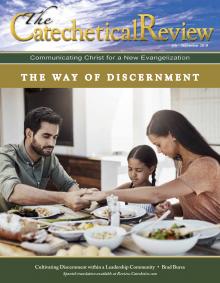We often ask children various versions of the same question: “What do you want to be when you grow up?” “What kind of job would you like to have?” Career days at elementary schools are built around this question. When I was in the sixth grade, we were assigned to investigate various careers and do a report about one we might like to pursue. I initially chose “psychologist,” but my father, who wasn’t a big fan of psychology, encouraged me to think of something else. I did my report on forensic pathology. (Spoiler alert: I became a psychologist anyway!)
As Catholics and disciples, what we want to be is only a piece of what we need to consider when thinking about our life’s path. A more relevant question is, “What is God’s plan for your life? What does he want you to be?” It seems that even many Catholic parents, teachers, and catechists are hesitant to ask this question. Perhaps we worry that it’s too much pressure to ask it this way. Many parents say they just want their kids “to be happy.” But we often don’t know what will make us happy. We search for happiness in all the wrong places: material possessions, status, power, and unhealthy relationships. In contrast, true and lasting happiness is found only in living the lives we were created to live. When we discover something new that we really enjoy, we often say, “I was made for this.” That’s because we are at our best, and often experiencing our greatest joy, when we are doing what we were made for. It’s time we start asking our young people, not only what they want to do, but what God has made them for.
For many kids and teens (and even some adults), there is no easy answer to this question. With a few exceptions in salvation history, God doesn’t usually speak in an audible voice and tell us what to do. Perhaps this is because of his profound respect for our free will. We might not feel like we had much choice if God audibly directed our most important decisions. Also, we tend to value things a little more if we have to work for them. If we have invested time and energy into our search for a purpose, we will be more engaged in that purpose when we find it. A third reason God might not tell us directly about his plan for our lives is that he delights in taking us on a “treasure hunt.” Some parents, on birthdays or Christmas, hide gifts in various places around the house and provide clues for their kids to find them. These parents talk about how exciting this makes the experience of opening the gifts and how much fun it is to see their children find what they have hidden. God is our Father. We are his children. And parents delight in those times when their kids find something they have hidden just for them.
The rest of this online article is available for current Guild members.
This article is from The Catechetical Review (Online Edition ISSN 2379-6324) and may be copied for catechetical purposes only. It may not be reprinted in another published work without the permission of The Catechetical Review by contacting [email protected]


















